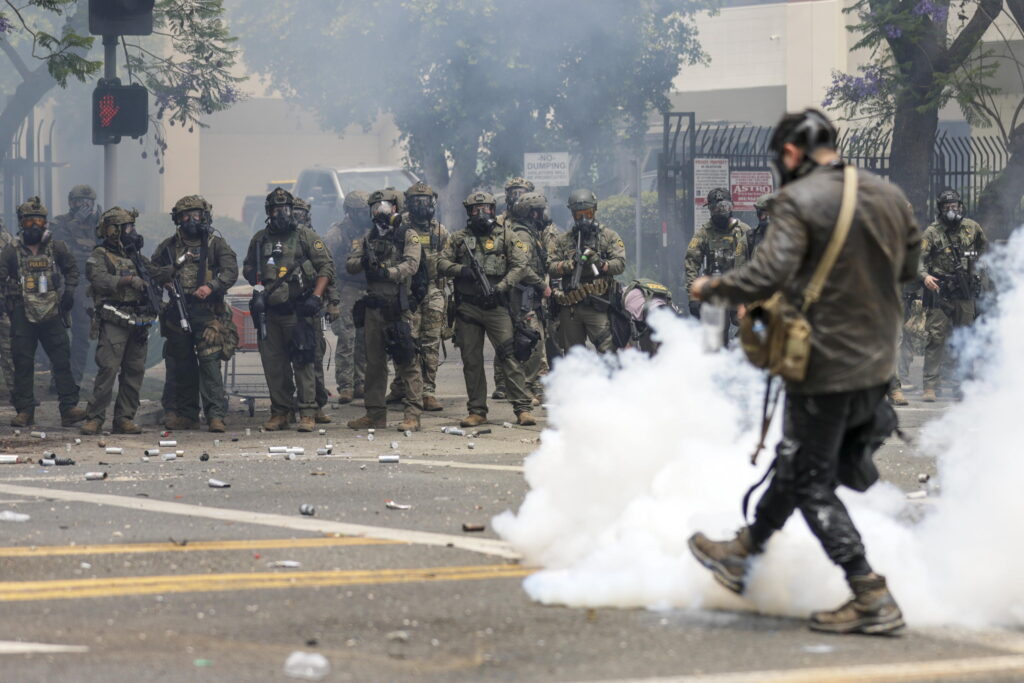
Echoes of Discord: When Political Rhetoric Fractures a Nation’s Soul
As localized unrest ripples through a major American city, the raw reality of clashes highlights the dangerous interplay between inflammatory discourse and a deepening societal fissure, exposing the profound human cost of a nation’s unresolved immigration debate.by
by Don Markson 9 June 2025
The vibrant tapestry of Los Angeles, a city synonymous with diversity and dynamic change, finds itself subtly frayed by recent incidents of localized unrest involving segments of its migrant population. These events, though contained in scope, serve as a potent, unsettling reminder of the profound fault lines running through the American social landscape, brutally pushing the contentious issue of immigration back into the unforgiving glare of national debate. The timing is acutely sensitive, occurring amidst an escalating national conversation about border integrity and the very fabric of identity, revealing how swiftly abstract political arguments can ignite tangible discord on urban streets.
Into this already combustible atmosphere steps President Donald Trump, whose pronouncements on immigration have long been characterized by their uncompromising and often incendiary nature. His recent interventions, delivered from the rally stage, have been widely criticized for their perceived role in fanning the flames of division and, more critically, for casting a stigmatizing shadow over entire migrant communities. This raises a pressing ethical question about the responsibility of political figures: does the pursuit of electoral advantage justify rhetoric that risks fracturing social cohesion and potentially inciting animosity towards vulnerable populations? While supporters argue he merely echoes public concern about border control, the impact of such language on the human experience is undeniable, transforming policy debates into deeply personal grievances.
The clashes themselves, involving relatively small groups, carry a disproportionately large symbolic weight, acting as stark manifestations of underlying tensions that fester in diverse urban centers. While local authorities diligently strive to comprehend the intricate dynamics and pre-empt any further escalation, the broader societal response reveals a deeply polarized nation. Community leaders and civil rights advocates, acutely aware of the perilous precipice upon which society stands, issue fervent pleas for calm and champion the urgent necessity of constructive dialogue. Their warnings against rhetoric that could inadvertently—or intentionally—incite hatred or violence underscore a critical understanding: that the complex socioeconomic factors underpinning these urban frictions demand nuanced solutions, not simplistic, often dehumanizing, political soundbites.
The immigration debate in the United States remains a crucible of contending ideologies, a relentless battleground of narratives that consistently push the nation to its limits of social cohesion. The Los Angeles incidents are not isolated occurrences but stark indicators of a fragile social fabric, particularly in areas where demographic shifts and economic pressures intersect with a highly charged political climate. They illuminate the astonishing power of political discourse to shape, and often distort, public sentiment, turning neighbor against neighbor. As the country navigates the treacherous waters towards crucial elections, the rhetoric surrounding immigration is poised to intensify further, promising potentially profound and lasting implications for the integrity of its social bonds and, most critically, for the lived realities of millions of human beings caught in the crosscurrents of political expediency.
#ImmigrationDebate #USPolitics #SocialCohesion #MigrantCrisis #PoliticalRhetoric #HumanCost #LosAngeles #EthicalLeadership #SocietalDivision